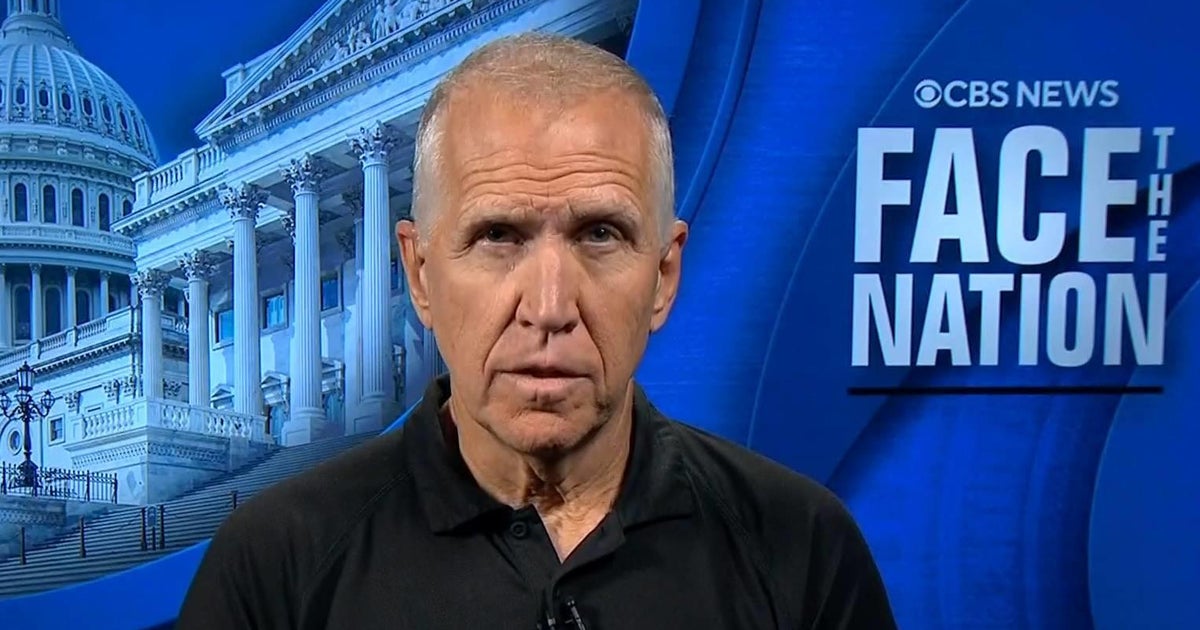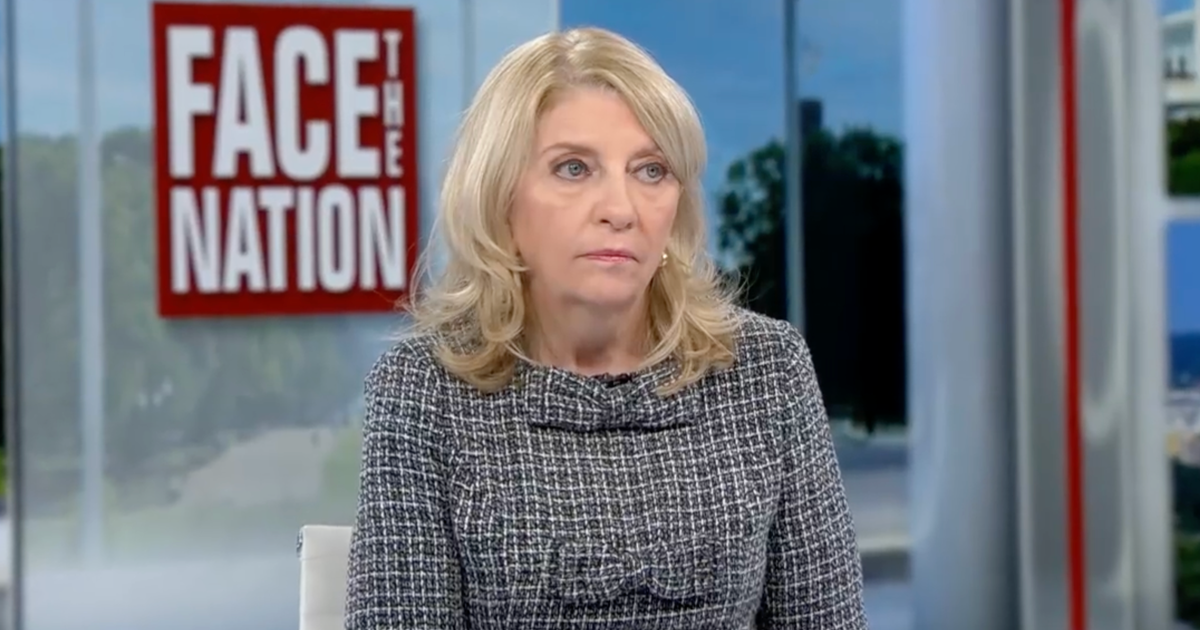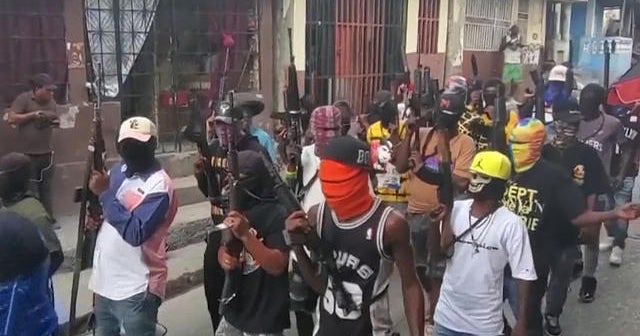CBS News
Carrie Preston talks returning to play “Elsbeth” in new spin-off series

Watch CBS News
Be the first to know
Get browser notifications for breaking news, live events, and exclusive reporting.
CBS News
Sen. Thom Tillis says “the scope” of Helene damage in North Carolina “is more like Katrina”

As recovery missions and repairs continue in North Carolina more than a week after Hurricane Helene carved a path of devastation through the western part of the state, the state’s Republican Sen. Thom Tillis called for more resources to bolster the relief effort and likened the damage to Hurricane Katrina’s mark on Louisiana in 2005.
“This is unlike anything that we’ve seen in this state,” Tillis told CBS News’ Margaret Brennan on “Face the Nation with Margaret Brennan” on Sunday morning. “We need increased attention. We need to continue to increase the surge of federal resources.”
Hurricane Helene ripped through the Southeast U.S. after making landfall in Florida on Sept. 26 as a powerful Category 4 storm. Helene brought heavy rain and catastrophic flooding to communities across multiple states, including Georgia, South Carolina, Tennessee and Virginia, with North Carolina bearing the brunt of the destruction. Officials previously said hundreds of roads in western North Carolina were washed out and inaccessible after the storm, hampering rescue operations, and several highways were blocked by mudslides.
Tillis said Sunday that most roads in the region likely remained closed due to flooding and debris. Water, electricity and other essential services still have not been fully restored.
“The scope of this storm is more like Katrina,” he said. “It may look like a flood to the outside observer, but again, this is a landmass roughly the size of the state of Massachusetts, with damage distributed throughout. We have to get maximum resources on the ground immediately to finish rescue operations.”
Hurricane Katrina left more than 1,000 people dead after it slammed into Louisiana’s Gulf Coast in August 2005, flooding neighborhoods and destroying infrastructure in and around New Orleans as well as in parts of the surrounding region. It was the deadliest hurricane to hit the mainland U.S. in the last 50 years, and the costliest storm on record.
The death toll from Hurricane Helene is at least 229, CBS News has confirmed, with at least 116 of those deaths reported in North Carolina alone. Officials have said they expect the death toll to continue to rise as recovery efforts were ongoing, and a spokesperson for the police department in Asheville told CBS News Friday their officers were “actively working 75 cases of missing persons.”
On Saturday, the U.S. Department of Transportation released $100 million in emergency funds for North Carolina to rebuild the roads and bridges damaged by the hurricane.
“We are providing this initial round of funding so there’s no delay getting roads repaired and reopened, and re-establishing critical routes,” U.S. Transportation Secretary Pete Buttigieg said in a statement. “The Biden-Harris administration will be with North Carolina every step of the way, and today’s emergency funding to help get transportation networks back up and running safely will be followed by additional federal resources.”
President Biden previously announced that the federal government would cover “100%” of costs for debris removal and emergency protective measures in North Carolina for six months.
With North Carolina leaders working with a number of relief agencies to deal with the aftermath of the storm, Tillis urged federal officials to ramp up the resources being funneled into the state’s hardest-hit areas. The senator also addressed a surge in conspiracy theories and misinformation about the Biden Administration’s disaster response, which have been fueled by Republican political figures like former President Donald Trump.
Trump falsely claimed that Mr. Biden and Vice President Kamala Harris, his Democratic opponent in the November presidential election, were diverting funds from Federal Emergency Management Agency that would support the relief effort in North Carolina toward initiatives for immigrants. He also said baselessly that the administration and North Carolina Gov. Roy Cooper, a Democrat, were withholding funds because many communities that were hit hardest are predominantly Republican. Elon Musk has shared false claims about FEMA, too.
“Many of these observations are not even from people on the ground,” Tillis said of those claims. “I believe that we have to stay focused on rescue operations, recovery operations, clearing operations, and we don’t need any of these distractions on the ground. It’s at the expense of the hard-working first responders and people that are just trying to recover their lives.”
CBS News
Face the Nation: Tillis, Tyab, Russel

Watch CBS News
Be the first to know
Get browser notifications for breaking news, live events, and exclusive reporting.
CBS News
Transcript: Catherine Russell on “Face the Nation with Margaret Brennan,” Oct. 6, 2024

The following is a transcript of an interview with Catherine Russell, UNICEF executive director, on “Face the Nation with Margaret Brennan” that aired on Oct. 6, 2024.
MARGARET BRENNAN: Catherine Russell is the executive director of UNICEF, the UN agency that helps disadvantaged children around the world. Good morning to you. I know you’re deeply concerned, you’ve said, by what is happening right now in Lebanon, 1000s of children on the streets or in shelters because they’ve had to flee without supplies. What does the speed of this escalation do to your ability to help these kids?
CATHERINE RUSSELL: Well, I think the speed and intensity is shocking, honestly, and it does make it challenging for us. However, we have been in Lebanon. We’re on the ground there. We are doing a lot of work, moving in tons of supplies, medical supplies and other supplies. But I think the challenge is that the population, about a million people, have been displaced, and so that kind of movement makes it very challenging to try to provide the services that people need. But I think, you know, we’re there. We’re doing it. Obviously we need more resources. It’s always a challenge. But I think I feel confident at this point that we can, we can meet the needs, but it takes, it’s taking a tremendous amount of effort on our part to do it.
MARGARET BRENNAN: The UN Refugee chief, one of your colleagues, said today that the strikes on Lebanon had violated international humanitarian law. Is that affecting your workers?
CATHERINE RUSSELL: You know, it’s, I would say, for humanitarian workers, the last year has been so challenging. I mean, we have lost a record number of humanitarian workers around the world. There are so many conflicts going on in so many places where they’re so vulnerable. And of course, you know, as the head of this, my operation, I worry constantly about our teams there and our staff there. And I think UNHCR, who you’re referring to, they did lose two staff people in Lebanon. And that’s a crushing thing to happen, because these people are so amazing, and they risk their lives every day to try to help children and desperate people. And to see that happen is really crushing.
MARGARET BRENNAN: UNRWA told CBS that they are heading down the track, to quote, a man made disaster again in Gaza. I was told the food deliveries have been continuously declining since May. There are law and order challenges, that’s part of the problem. 1 million people didn’t get food in August. That number now is 1.4 million. How bad is the malnutrition and the hygiene and the mental health of kids there?
CATHERINE RUSSELL: It’s all terrible. And I think if you look at Gaza really through the eyes of a child, it’s a hellscape for children. They’ve been moved multiple times. They know people, their family members, who’ve been killed, they’ve been injured. They don’t have enough food to eat, they don’t have enough water, they don’t have clean water. I think these children, you know, you mentioned it earlier, they’re so traumatized by what’s happening. And I think the notion that we can even, even if we can get more supplies in there, the trauma that these children are suffering is going to have lifetime and even post generational challenges for them, because it’s just so profound. And it’s been almost a year of this. They really-it’s hard to imagine what that’s like for a child. You know, you can’t really imagine anything comparable for them. And I think they have no security, they have no certainty in life. They’re just really suffering every single day.
MARGARET BRENNAN : But you were able to get polio shots into kids. How come you can’t get them food?
CATHERINE RUSSELL 3:16
Yeah, it’s such a good question. You know, we, I mean, first I would say it’s terrible that we had to go in and do polio vaccinations. Right. There hadn’t been polio in Gaza for years, decades, really. And of course, we started to see some cases of it. That’s because they’re living in such terrible conditions, the water is dirty and all the rest of it. So we were able, with other UN agencies, to go in and vaccinate children for polio- vaccinated well over half a million children. I mean, 500 million children. It was a, it was a real success story. And I think the important point about that is it shows that if the authorities there help us make it possible for us to do our work, we can do it. We can definitely do it, but we need more support so that there’s security. As you say, there is not security right now. it’s very dangerous to move things around. The roads are a mess. We get stuck at checkpoints. I mean, it’s just one logistical problem after another. And I think the polio lesson is we can do it, and they can help us do it if they choose to.
MARGARET BRENNAN: If there’s coordinated international pressure to allow for it. Moving away from the Middle East and to Africa. I know Sudan is an issue you have been trying to put on the world’s radar for some time. Nearly 4 million children under five are acutely malnourished, and there’s a cholera outbreak. Can you break through there, another war zone?
CATHERINE RUSSELL: Sudan is, is the most alarming place for me at the moment because of the scale of it. Right? It is the largest displacement crisis in the world and the largest hunger problem in the world. We have already declared that there is famine in part of Sudan. Right? Children are grossly malnourished, and children are on the verge of famine in many places where it hasn’t already been declared. There’s also incredible violence. Children are moving constantly. They’re very vulnerable. I was there, you know, several months ago, and the stories I heard were heartbreaking, of what children had seen and experienced. Of this 19 million children who live in Sudan, 17 million have been out of school for over a year.
MARGARET BRENNAN: 17 out of 19 million children are out of school?
CATHERINE RUSSELL: Are out of school, yes, for over a year, right? What kind of life is this? They can’t get medical supplies. It’s really challenging for them. But I will say this, I met with some children in a camp that UNICEF supports, and the amazing thing was, they could still talk to me about the future,their hope for the future. Which I, you know, I’m always struck by this, that children are children everywhere, and even in the most desperate places they can have hope. But the international community has got to do better, and in Sudan, everyone has got to put pressure on the parties to stop the fighting and to stop making lives so miserable for children.
MARGARET BRENNAN: Catherine Russell, thank you.
CATHERINE RUSSELL: Thanks.
MARGARET BRENNAN: We’ll be back in a moment.







